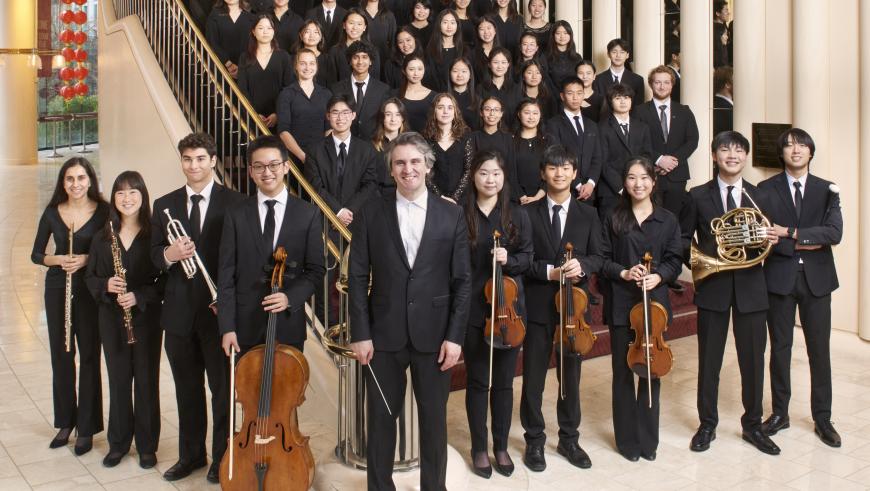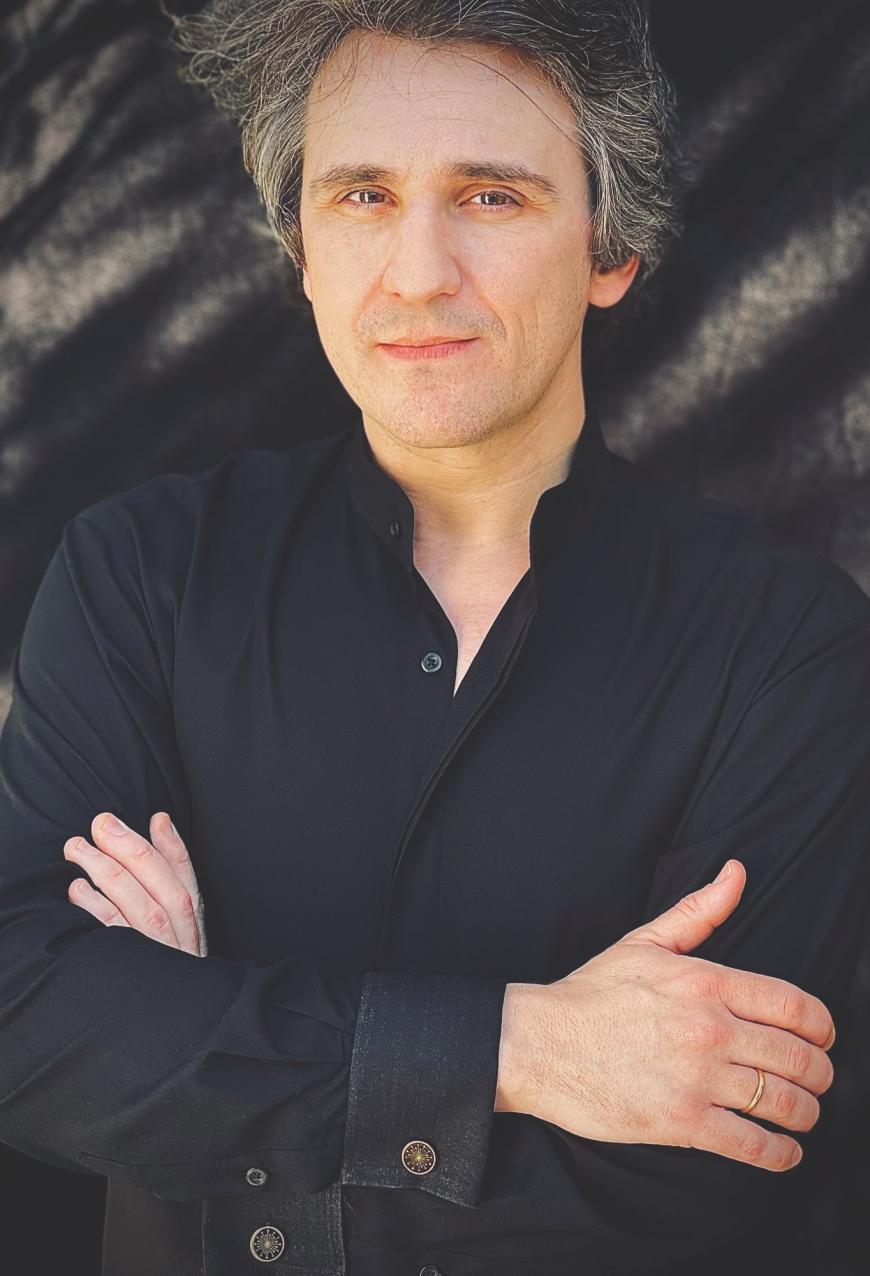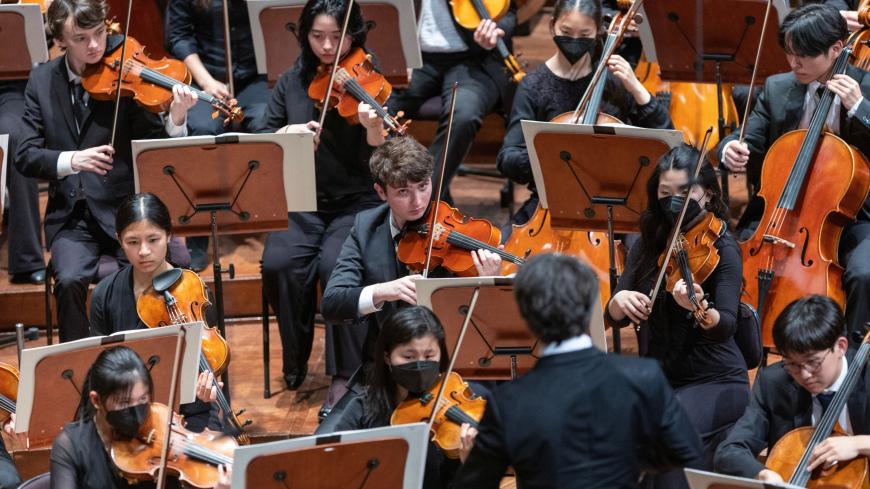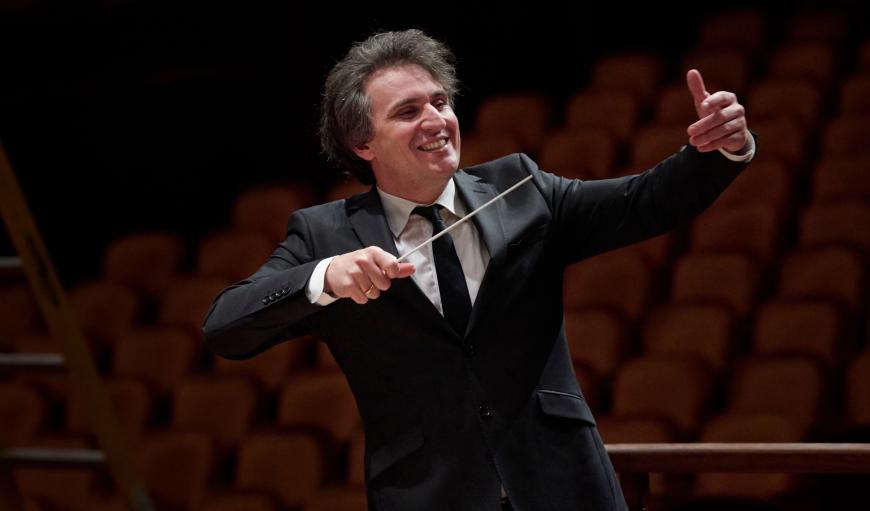
Watching Daniel Stewart conduct, you can’t help but notice his intense enthusiasm, energy, and joy. Also an accomplished violist, composer, and arranger, the 42-year-old San Francisco native has put a distinctive stamp on his many musical endeavors in the Bay Area and beyond. Since 2013, he has been the music director of the Santa Cruz Symphony, where he has gotten attention and accolades for his innovative and eclectic programming.
He is also about to finish his five-year tenure as music director of the San Francisco Symphony Youth Orchestra (SFSYO) and will be conducting his final concert with that ensemble on May 19, a performance of Gustav Mahler’s Symphony No. 5. (Radu Paponiu succeeds Stewart as SFSYO music director, beginning with the 2024–2025 season.)

Stewart started Suzuki violin lessons when he was 4 years old and discovered the viola at a summer festival when he was 10. The timbre of the larger instrument, “in that middle range between the various parts,” spoke very strongly to him. He began playing with the Marin Symphony Youth Orchestra when he was 12, the Santa Rosa Symphony Youth Orchestra at 13, and then joined SFSYO at 14, which had a huge impact on him.
Stewart said that the opportunity afforded by SFSYO to study with the musicians of a world-class symphony orchestra, along with the “endlessly vast and diverse classical repertoire,” was absolutely thrilling and that he “became so enamored of classical musical thought and performance that it made it very easy to visualize continuing to pursue that — to grow and to really explore my potential.”
For a number of years, Stewart toured extensively as a violist, as well as served as principal of several ensembles, including the New World Symphony in Miami Beach. But eventually, his “fascination and love of the symphonic repertoire” and desire to explore it further led him to choose conducting as his primary focus, though he still performs on viola. He also loves to collaborate on contemporary projects and compose.
Stewart and his wife In Sun Jang, who is a first violinist with the San Francisco Symphony and also serves as a violin coach for SFSYO, recently bought their first house in San Francisco. A recent chat with Stewart revealed more about his musical journey.
How has your experience as music director of SFSYO influenced you personally and professionally?
My time with the youth orchestra has been so rewarding, just an extremely wonderful honor and privilege to help lead this generation of young musicians in their development — and with an organization that meant so much to me growing up. There’s nothing better than seeing people reach their potential, really discover agency, and form the basis of an entirely new worldview in so many very meaningful and profound ways, at very impressionable moments in their lives, [and] in the context of such support and mutual respect, while always upholding the highest standards.

I treat them exactly as I would treat the Vienna Philharmonic, and they respond with that type of respect and seriousness of purpose. Because there is such tremendous potential in us all, when you see these young artists really flourishing, that in turn just illuminates everybody else who witnesses it. It’s a very special process, and I’ve learned so much and certainly hope I have given as much back to them.
You have been with the Santa Cruz Symphony since 2013, and in 2021, you extended your contract for another 10 years. What has your experience been like there?
It’s been a dream to bring in some of the world’s greatest artists to this beautiful, creative, inquisitive, and just completely dynamic community and to help everything flourish. I have brought in many friends and colleagues from the Curtis Institute of Music [where Stewart trained as a conductor] who have now joined the orchestra, and we have an absolutely sensational new concertmaster, Nancy Zhou.
We’ve done incredibly adventurous contemporary music and many world premieres. It’s been an incredibly rewarding experience so far, and we are just getting started. We have brought in more than 30 principal singers from the Metropolitan Opera [where Stewart was assistant conductor from 2012–2015], which has been a great joy because [hearing] the world’s greatest singers, up close and personal in a very intimate environment, such as the ones we play in, is just an experience you won’t find anywhere else on earth.

Tell me about some of your more contemporary collaborations, such as conducting classical ensembles for composer Mason Bates’s club series Mercury Soul and at Burning Man.
I am fascinated by this new horizon of so many different sonic possibilities between acoustic and electrical landscapes like Mercury Soul. There is so much more music now that incorporates so much of each, and it starts to become very contemporary, very unique, and very exciting because it’s all being created with very new colors on the palette. I feel a great sense of possibility in this area.
And 10 years ago, when I was doing Burning Man, I was putting musical constellations up in the air with very primitive drones. I had everything from [Antonio] Vivaldi cantatas to all kinds of EDM and every mix of pop and rock and classical music interacting in spatial ways, very specifically mapped out. We had to find speakers that would remain attached to the drones in ways in which you could still hear the speakers.
How are you planning to fill the time that was taken up by SFSYO?
This is really a special moment in my life, and I am really looking forward to having the opportunity to create a good work-life balance. These past five years have been very special, but to be in charge of nurturing two groups that don’t have a deep infrastructure doesn’t leave very much time for other focuses. So I am going to continue developing Santa Cruz in a very creative direction, and I am very much looking forward to that, as well as more guest conducting and more composition and all the other creative avenues that I can pursue.
Correction: As originally published, this article misspelled In Sun Jang’s name. We regret the error.




